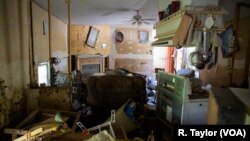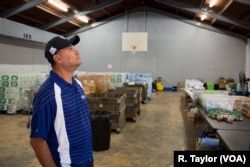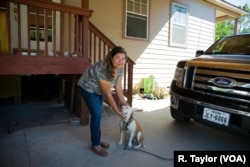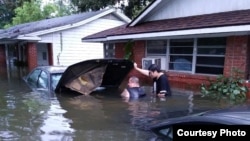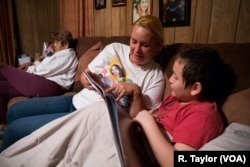NOTE TO READERS: This is the first of a three-part series on Houston's recovery.
HOUSTON — Beside a black spore-infested mobile home in east Houston, Valerie Van Note lays the seats flat in the back of a Lincoln Navigator — one lent to her by a friend — and pats the bags of blankets and pillows she keeps neatly folded.
"These are some of my dog beds I got to save," Van Note's gray eyes fill with tears as she remembers her three dogs that drowned in Hurricane Harvey's record floods in August. "I washed them, and I use them as a mattress."
On August 26-30, the hurricane-turned-tropical storm Harvey stalled over southeast Texas, dumping a five-day total of 114 centimeters of water over parts of Houston.
Roughly 25 percent to 30 percent of Houston's Harris County became submerged, running up a tab of $190 billion in losses — the costliest storm in U.S. history.
Were it not for a floating spare tire, the five-day downpour might have taken Van Note's life, as it did that of at least 75 other Texans, 50 of whom drowned.
But on the second day of heavy rain — a Sunday morning — Van Note paddled the tire past her porch and across the street with one hand, holding a small bag with some cash savings and prescription medicine in the other. She grabbed onto a pole where a neighbor would eventually see her and come to her rescue by boat.
WATCH: How One Texan Gets By After Hurricane Harvey
Survivors, left behind
More than two months since the storm passed, the sports utility vehicle where Van Note sleeps at night is a temporary solution in a permanent struggle to find affordable housing and work. Like her neighbors, a mix of native-born and mixed-immigration status Houstonians, she finds every day a struggle in one of Houston's worst inundated areas — which had no luxuries to begin with.
Within the circle of trailer homes on Spicewood Lane, residents feel the city has claimed recovery and moved on without ever checking on them. So they persevere on their own.
During the day, Van Note collects scrap metal, but can't afford the gas required to transport and sell it. Between payments on a small storage unit and insurance on the Navigator — part of the deal with her friend — she exhausts $113 a month.
With her Lone Star food stamps and some savings, Van Note has managed "just to survive," a common narrative in Houston's poorest residential areas by the Greens Bayou. She mostly stays put, keeping her neighbors' pets fed in the shade of the yard, next to the trailer where she previously lived, in case its 73-year-old owner — with whom she stayed as a companion — were to return.
"[Recovery is] going to take a long, long, long time," Van Note said.
"Months?"
"Years."
'Nothing is normal'
#HoustonStrong — a mantra of relief and recovery — spreads hope across the metropolitan area of 6.5 million residents. But stories of tragedy and ruin surface regularly in the hurricane's aftermath.
In an effort to combat complacency and a drying-up of donations, Bethel Baptist Church Lead Pastor Jaime Garcia took to social media to promote a different slogan, #NothingIsNormal.
Every week, he visits Houston families still affected by the hurricane to raise awareness of their needs. "People are having a hard time rebuilding, for whatever reason. … There are a lot of faces to this," Garcia explained.
Many of them — 600,000 residents, or nearly one out of every 10 Houstonians — are undocumented, and thus not eligible for Federal Emergency Management Agency (FEMA) cash assistance. Even where donated resources are available, many are hesitant to come forward out of fear of deportation.
Van Note won't name names, but she mentions neighbors that fall into this category.
Ester Leija, a legal resident from Valle Hermoso, Tamaulipas, is part of a mixed-status Mexican family down the street. Though she qualified for FEMA aid, she is still struggling to rebuild the interior of her home, which flooded 135 centimeters, a level just below her neckline.
The problem she now faces is a requirement to obtain a city permit and raise her home 46 centimeters before installing drywall on her own — measures that she says are both costly and a burden to her family.
"They want us to contract an engineer, and I don't know what the cost is, but we can't afford it," said Leija, adding that the obstacles have forced her to decline assistance from volunteers.
"We have to explain to them that we are grateful that they want to help, but we can't rebuild," Leija said. "And we don't have anywhere else to live."
Through tragedy, courage
Less than two kilometers from Van Note and Leija, Andrew Saldivar resides west of Greens Bayou with his fiancee, Therese Taylor, and five of his six kids.
During Harvey's high flooding, he and his family lost six loved ones — four nieces and nephews, ages six to 16, and his grandparents, Manuel and Belia Rojas Saldivar. All six drowned in a van after it slid into the bayou's high waters, near Saldivar's home, while attempting to reach dry land.
Regularly, he pulls over at the bayou, alone, beside a makeshift memorial of pink-and-purple balloons and flowers.
"I don't sleep no more," Saldivar said. "I wake up screaming — I see my nieces and nephews — get 'em out the van!'"
Already a heavy equipment operator and evening Pizza Hut delivery driver, Saldivar, who is American born, took on a third job following the hurricane — an additional pizza delivery shift — in order to make ends meet for his immediate and extended family and neighbors. Together, he and Taylor regularly feed and shelter more than 20 people inside his home, which escaped the worst of the flooding.
"After I lost my family, I didn't want no one else to suffer," he said. "The only thing that helps me is helping everyone."
'The Lord takes care of you'
Between combined 18-hour shifts, donations, and D-SNAP (Disaster Supplemental Nutrition Assistance Program) funding, Saldivar and his fiancee attempt to keep everyone's lives running as normally as possible, one day at a time.
On a rare night off, he provides a tour of their three-bedroom home. Every corner is stocked with a different bulk item: 40-packs of bottled water, a tub of canned ravioli.
In the living room, family portraits, oak beadboard paneling and massive piles of blankets make for a cozy setting. The Saldivars make extra space on the couch and rug for visitors to sleep in a space with four dry walls, at least for the night.
"The Lord takes care of you." Saldivar counts his blessings, too: His home is intact, he is able to help others and he is a fiercely proud dad. His eldest daughter, 17, plans to become an attorney, judge and congresswoman, "in that order." But first, he must find a way to pay a portion of her college tuition.
Saldivar doesn't flinch much. "If I have to, I'll get a fourth job."




